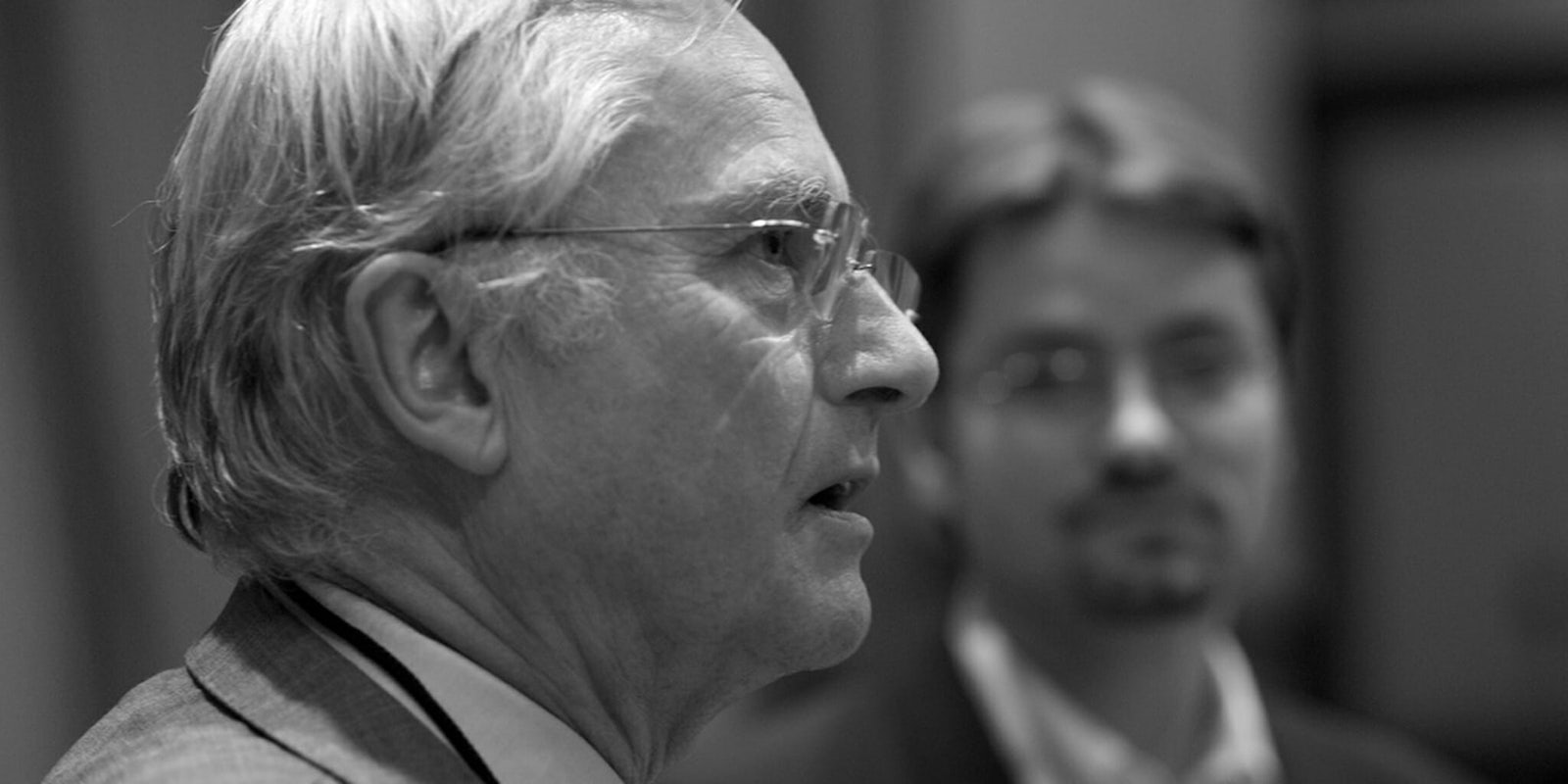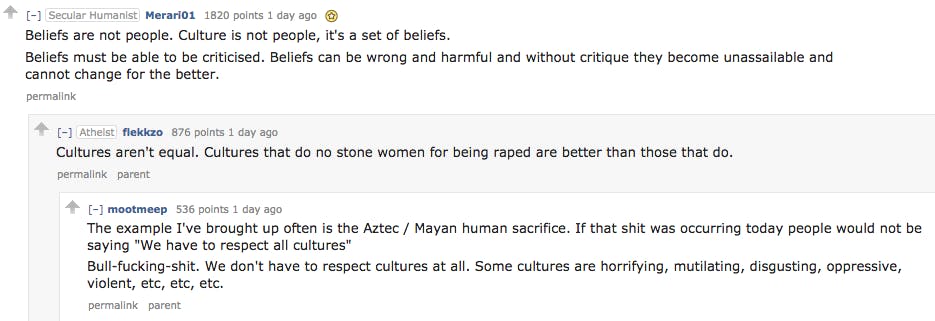Richard Dawkins, the British biologist and prominent atheist, has found himself in a firestorm of controversy over recent comments about Muslims. Back in July, Dawkins took to Twitter to declare: “Islam needs a feminist revolution. What can we do to help?” While well-intentioned, the tweet was criticized for its condescending tone, as well as Dawkins’ ignorance of the history of women’s movements in Islamic society.
Islam needs a feminist revolution. It will be hard. What can we do to help?
— Richard Dawkins (@RichardDawkins) July 23, 2015
This weekend, Dawkins doubled down in an interview with frequently controversial TV host Bill Maher, saying “to hell with their culture” while criticizing liberals who defend Islam. “If we talk about them at all or criticize at all, it’s somehow hurting or humiliating Muslims,” he argued. “It’s a ridiculous idea.”
There is a concerning trend in secular thought to attack religion as “the root of all evil” (which also happens to be the name of a Dawkins-led BBC documentary series about religion). And in his comments, Dawkins seems to be targeting the treatment of women in many Islamic countries—which use religion to justify stoning rape victims and criminalize homosexuality. Dawkins is wrong, however, to target the Quran as the source of these atrocities: Atheists shouldn’t hold an entire religious community responsible for the actions of governments and fundamentalist state religions.
As we can see from Dawkins’ tweet, there’s a thin line between combating prejudice and creating more of it.
If there’s any doubt about Dawkins’ pull on the Web, let Reddit’s popular atheism subreddit—which boasts over two million subscribers—clear it up for you. Richard Dawkins adorns the forum’s front page banner.
Although atheism is (by its very definition) a decentralized ideology, Dawkins has become the largest figurehead for the so-called “New Atheism” movement that gained popularity in the early aughts—with the rise of the social Web. His 2006 bestseller, The God Delusion, is a seminal handbook for questioning theists across the Internet. Dawkins, along with philosopher Sam Harris, biologist Daniel Dennett, and the late conservative columnist Christopher Hitchens, were often billed as “The Four Horsemen” of a new brand of secularism—and remain very popular with online secular communities.Atheists shouldn’t hold an entire religious community responsible for the actions of governments and fundamentalist state religions.
Thus, it’s unsurprising that the active community quickly leapt to Richard Dawkins’ defense after his appearance on Maher’s show. “Cultures aren’t equal,” commented Redditor flekkzo on a post about Dawkins’ comments. “Cultures that do not stone women for being raped are better than those that do.” User warlock4u further suggested that “their culture must be very fragile indeed” if Muslims were offended by Dawkins’ comments, and KnowMatter wrote: “Not every culture deserves to exist in the modern world, that is the sad truth.”
Instead, Dawkins and his followers should attack the structures that allow for the systematic oppression of women and LGBT people. As Salon’s Steve Neumann explains, blaming Islam is exactly the wrong response—as religion usually functions as a scapegoat for man’s will to power. According to Neumann, religious fundamentalism “arises primarily out of a preoccupation with power. Not power in the sense of brute physical dominance over others…. but power as the basic psychological drive of the human animal. The thwarting of that drive is the root cause of both terrorism and violence generally.”
Attacking religion, thus, addresses the symptom, not the cause.
And this problem is not exclusive to Christianity—or even religion itself. Dawkins and his defenders are likely aware of the many atrocities committed in the name of Christianity—from the Crusades and the slaughter of Native Americans up to the bombing of abortion clinics. Likewise, Pol Pot, Joseph Stalin, and Mao Tse-Tung slaughtered tens of millions without a whiff of religious influence.
The sheer variety of governments and leaders that have been responsible for genocides and mass oppression should combat the idea that any religion could be to blame for the worst of human behavior—and this is why Dawkins’ continued crusade has met with considerable pushback from Twitter users. Twitter user @redbeansrule criticized Dawkins for his “patronizing white savior paternalist Islamophobia.” User @bagelsmalls answered Dawkins plea to help Muslim women with “we can start with the fact that nobody wants your help” and prominent Muslim lawyer Qasim Rashid suggested, “This is where you follow through on ‘how to help’ by being quiet & listening.”
https://twitter.com/MuslimIQ/status/624679222603313152
Dawkins’ solution to Islam’s problems—namely, by abolishing it altogether—may be alarming but it’s also not new—and it’s hurting the movement. As author Chris Hedges points out, Dawkins brand of “secular fundamentalism” tends to find itself with odd ideological bedfellows. “Its political agenda dovetails with the most retrograde elements of the Christian Right,” Hedges said in a recent interview.
Dawkins and his followers should attack the structures that allow for the systematic oppression of women and LGBT people.
Prominent secular thinkers like particle physicist Peter Higgs (of the Higgs boson) have also criticized Dawkins for a one-size-fits-all approach to criticizing people of faith, punishing the middle for its extremes. Higgs called Dawkins’ anti-religious furor “embarrassing”: “What Dawkins does too often is to concentrate his attack on fundamentalists. But there are many believers who are just not fundamentalists.” Here, Higgs important recognizes the wide diversity of practitioners in every religion.
In addition to being factually inaccurate, Dawkins’ methods are ideologically dangerous for atheism to be associated with in the current religio-political climate. Anti-Muslim sentiment is spreading across Europe—following the Charlie Hebdo attacks in January and the ongoing Syrian refugee crisis. In recent surveys, 43 percent of French citizens said they see Islam as a threat to France’s national identity, and between 66 and 74 percent of Germans also confess to having “negative attitudes towards Muslims.”
These are countries that are far more secular than the United States, yet they—like Richard Dawkins—seem to echo the worst sentiments of Christian conservatives. In recent weeks, GOP presidential contender Ben Carson has said Islam is not compatible with the U.S. Constitution and that the Founding Fathers would never have supported a Muslim president. He is currently polling second in the race.
Atheists should be wary of turning their disdain for religion into a disdain for the religious, especially at a time when reactionary bigotry is gripping both America and Europe. Dawkins is not wrong to call for a stronger defense of human rights in the Arab world—or anywhere else—but Dawkins, and atheists as a culture, should be aware of the slippery slope of their own fundamentalism. Whether he means to or not, Richard Dawkins is leading the rest of secularism down a hole of xenophobia and cultural bigotry.
Gillian Branstetter is a social commentator with a focus on the intersection of technology, security, and politics. Her work has appeared in the Washington Post, Business Insider, Salon, the Week, and xoJane. She attended Pennsylvania State University. Follow her on Twitter @GillBranstetter.
Photo via DaveFayram/Flickr (CC BY SA 2.0)



